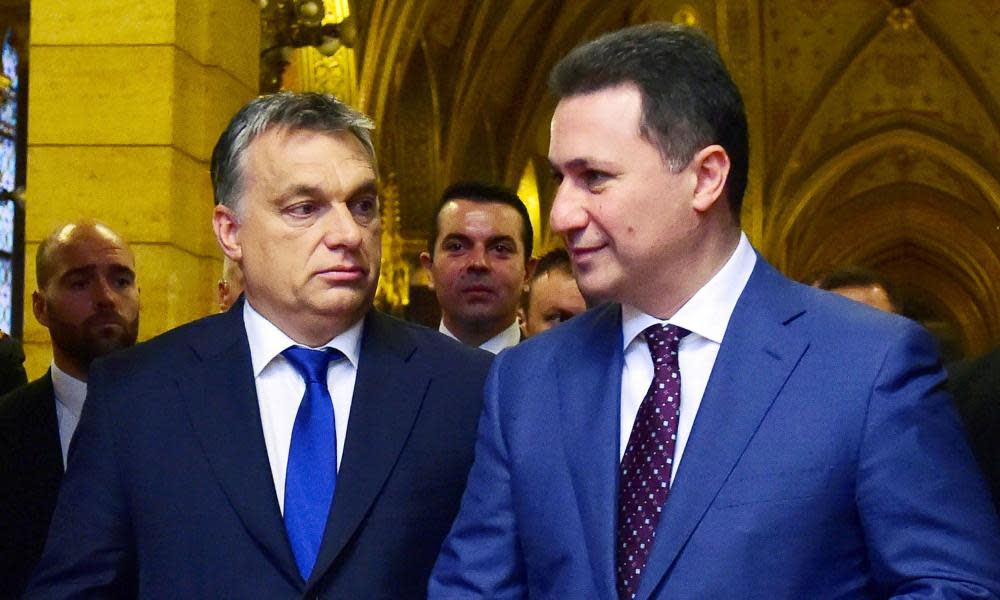Anti-asylum Orbán makes exception for a friend in need

Macedonia’s former prime minister Nikola Gruevski, who fled the country last week rather than report to jail to serve a two-and-a-half-year sentence for corruption, announced on Tuesday that he had been granted political asylum in Hungary.
He wrote on his Facebook page that he had been the victim of a “political witch-hunt” in Macedonia and that Hungarian authorities had granted his request for asylum. Earlier in the day the Hungarian government-linked Magyar Idök newspaper wrote that Gruevski’s application had been approved. Hungarian authorities made no official comment on the matter.
Hungary’s prime minister, Viktor Orbán, has prided himself on making his country one of the hardest places in Europe in which to claim asylum, and he has plastered cities with billboards emphasising that migrants and refugees are not welcome. This distaste does not, apparently, extend to Gruevski, who has had a long friendship with Orbán dating back to Gruevski’s 10-year rule over Macedonia.
Gruevski stepped down as prime minister in 2016 after a wire-tapping scandal, and was accused of dictatorial impulses, erosion of rule of law and corruption. He was sentenced by a court in May.
The exact nature of Gruevski’s route to Budapest remains unclear, but it appears he passed through Albania, Montenegro and Serbia, with the assistance of Hungarian authorities. Albanian authorities have said he exited the country last week in a car belonging to the Hungarian embassy.
Unlike most asylum seekers, Gruevski was not forced to wait in a holding pen at the Hungarian border while his application was processed, instead being allowed to remain in Budapest. He has not been seen in public since leaving Macedonia.
A Hungarian government spokesman, Zoltán Kovács, said Gruevski was allowed to wait in Budapest because “precedent suggests that extraordinary cases like this merit extraordinary consideration”. The extreme speed with which his case has apparently been resolved suggests special treatment.
Macedonian authorities say Gruevski received a fair trial and they have submitted an extradition request. The foreign minister, Nikola Dimitrov, said it is “impossible to digest” that Gruevski would seek refuge in an EU country, after the European commission had accused him in 2016 of transforming Macedonia into a captured state.
Márton Gyöngyösi, a Hungarian opposition MP from the Jobbik party, said officials told a parliamentary national security committee earlier in the day that Gruevski’s request was still under consideration and would take time to process. “Someone is lying, and I’m not sure it’s Gruevski.” He said he believed there must have been a top-level decision to grant asylum.
“He’s a convicted criminal in his own country and he should have been returned immediately,” Gyöngyösi said. “I can’t think of one good reason to risk an international scandal for this, unless there is an enormous corruption case or a hidden geopolitical aspect.”
Macedonia is in the process of ratifying an agreement with Greece to change its name to North Macedonia, paving the way for Nato and EU accession. Gruevski’s VMRO party, as well as Russia, have been strongly critical of the deal.
The move to grant asylum, if confirmed, is the latest in a series of provocative gestures by Orbán that have left other EU countries and Nato allies stumped about how to respond. Threats of disciplinary action from the European parliament have so far merely played into Orbán’s rhetoric that he is under attack from “pro-migration” forces in Brussels, while more conciliatory approaches also seem to have failed.
David Cornstein, the new US ambassador to Hungary and a personal friend of Donald Trump, has said he will not criticise Orbán publicly, but he has asked the government to keep the Central European University operational. The university was founded by George Soros, the philanthropist and financier whom Orbán has demonised and accused of undermining Hungary’s sovereignty.
Despite Cornstein’s attempts at mediation, the Hungarian government has not signed an agreement to allow the university to stay, and the university has said it will begin a slow shifting of operations to Vienna next year.
Orbán won a two-thirds parliamentary majority in April elections that gave him a third consecutive term in office, and has positioned himself as a leader of rightwing, anti-migration forces across the continent before European elections due next year.

 Yahoo News
Yahoo News 
